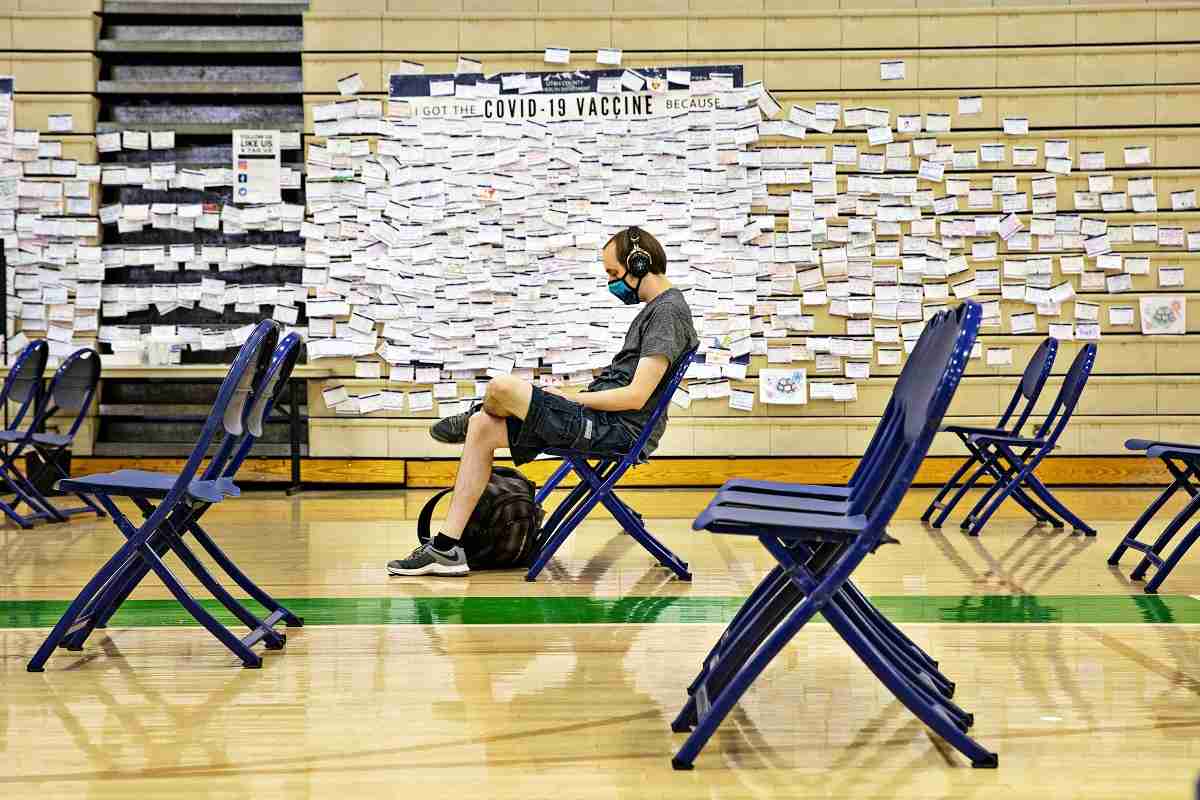
A young man waits in an empty patient waiting area after receiving a coronavirus vaccine at a vaccination site on June 2, 2021, during a time when the division in attitudes toward scientists grew rapidly.
17:08 JST, November 15, 2024
The pandemic and the chaos and controversies that came with it led to an erosion of trust in scientists, and it may be a while before that trust returns to levels that preceded the contagion. That’s the implication of a survey published Thursday by the nonpartisan Pew Research Center.
The organization asked adults in the United States if they have confidence in scientists to “act in the best interests of the public.” The vast majority of people still do, saying they have “a great deal” or “a fair amount” of confidence.
But although the new numbers show a small uptick in trust in scientists over the past year, the public’s confidence in that community remains significantly eroded.
When Pew conducted such a survey in January 2019, 86 percent of respondents said they had “a great deal” or “a fair amount” of confidence in scientists. That sentiment held steady at 87 percent in the April 2020 survey at the height of the initial wave of infections that struck the United States. But in a survey in November 2020 that figure began to show the erosion, and trust bottomed out at 73 percent in October 2023.
The latest result showed a small bump to 76 percent.
“We’re calling it a slight uptick,” said Alec Tyson, associate director at Pew Research Center and lead author of the report. “At least for now, it marks an end to the decline that we saw during the pandemic.”
The survey captures a partisan divide over scientists and their role in crafting policy. Democrats have a higher level of trust in scientists than Republicans, and are significantly more positive than Republicans about scientists being engaged in policy discussions.
Americans give research scientists fairly high marks for intelligence and the ability to solve real-world problems. But only 65 percent view them as “honest,” and 47 percent described them as feeling “superior to others.” Slightly more than a third of respondents said scientists don’t “pay attention to the moral values of society.”
“My reading of that data is there’s room for scientists to be seen as more connected to the everyday issues that people face in their own lives,” Tyson said.
The survey comes at a moment of uncertainty for scientific organizations and government agencies as President-elect Donald Trump assembles a new administration. In his first term, Trump’s initial budget requests called for cuts in funding of some scientific research, but science has enjoyed bipartisan support in Congress.
The partisan divide in attitudes toward scientists grew rapidly between the April 2020 and December 2021 Pew surveys. Among Republicans and independents leaning Republican, confidence in scientists fell from 85 percent to 63 percent.
In that period and beyond, the pandemic generated a swarm of controversies that pivoted on scientific research but were also influenced by misinformation and political agendas. Social media provided a decentralized platform for robust and rancorous debates about school closures, social distancing, potential cures for covid, the utility of masks and the origin of the virus.
Scientists such as Anthony S. Fauci, the most prominent spokesperson for the scientific community during the pandemic, have been grilled by Republican lawmakers in contentious congressional hearings. Across the country, public health officials endured a ferocious backlash.
“What you had was a sustained attack on a sector of science,” said Kathleen Hall Jamieson, director of the Annenberg Public Policy Center at the University of Pennsylvania.
In the latest survey, however, Republican trust in scientists increased 5 percent, noted Tyson. And he said Democrats have also experienced a shift in attitudes since 2021: They are much less likely to say they have a “great deal” of confidence in scientists.
Science is not the only enterprise facing an erosion of trust. Surveys have shown a significant decline in the percentage of Americans who trust the federal government, the Supreme Court, political parties, business leaders and the news media.
“Overall we’re seeing decline in trust in institutions,” Jamieson said. “Confidence in and trust in science remains high compared to those other institutions.”
But scientists made mistakes, she added. For example, some oversold the ability of vaccines to prevent covid infections.
“People were told if you just took the vaccine, everything was going to be fine,” she said.
Marcia McNutt, president of the National Academy of Sciences, recalls that in early 2020 a reporter asked her to forecast the impact of the spreading coronavirus. Her response: “This will be science’s finest hour. Science is going to come up with a vaccine to save us all.”
The vaccines did appear – and yet trust in science went down.
“Every scientist I know would have loved to see a massive rebound” in trust in science, McNutt said, referring to the Pew results. “But this gives us an opportunity to reexamine what we need to do to restore trust in science.”
Top Articles in News Services
-

Survey Shows False Election Info Perceived as True
-

Hong Kong Ex-Publisher Jimmy Lai’s Sentence Raises International Outcry as China Defends It
-

Japan’s Nikkei Stock Average Touches 58,000 as Yen, Jgbs Rally on Election Fallout (UPDATE 1)
-

Japan’s Nikkei Stock Average Falls as US-Iran Tensions Unsettle Investors (UPDATE 1)
-

Trump Names Former Federal Reserve Governor Warsh as the Next Fed Chair, Replacing Powell
JN ACCESS RANKING
-

Producer Behind Pop Group XG Arrested for Cocaine Possession
-

Japan PM Takaichi’s Cabinet Resigns en Masse
-

Man Infected with Measles Reportedly Dined at Restaurant in Tokyo Station
-

Israeli Ambassador to Japan Speaks about Japan’s Role in the Reconstruction of Gaza
-

Videos Plagiarized, Reposted with False Subtitles Claiming ‘Ryukyu Belongs to China’; Anti-China False Information Also Posted in Japan






















